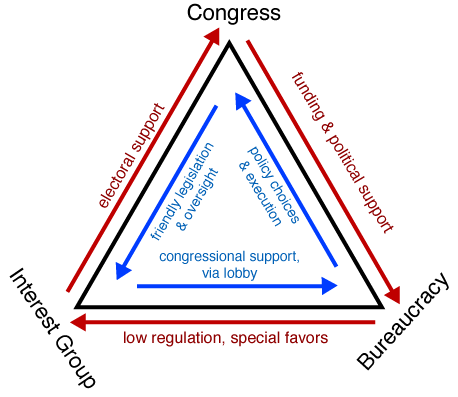What Do Interest Groups The Federal Bureaucracy And Congress Makeup
In American politics, there are official also as unofficial institutions that shape the development of policy and the administration of government. The AP® United states Government & Politics examination will exam your knowledge of these institutions, as well equally how these institutions work together.
The policymaking relationship between congressional committees, the bureaucracy and interest groups is referred to as the Iron Triangle.
What is an Iron Triangle?
The Iron Triangle is a concept , not an institution. It is the idea that committees in the House and Senate, federal departments and agencies, and think tanks and interest groups all piece of work together to develop and conserve their own power, and expand their political influence.
There are agencies of the federal government, such as the Department of Veterans Affairs, that are tasked with providing services to consumers—the American public. This DFA, for example, provides veterans with medical and financial benefits.
In Congress, there are respective committees and subcommittees—such as the Firm Committee on Veterans Affairs—that make policy on matters relating to veterans diplomacy, including what types of benefits to give to veterans and how to disperse them.
Outside of government, there are various interest groups, such as the VFW—the Veterans of Foreign Wars—that advocate for veterans. This advocacy includes performing inquiry and issuing reports most veterans' issues, likewise as educating and lobbying Congress.
These three groups—congressional committees, bureaucracies and interest groups—have a symbiotic relationship. They are the corners, or bases, of the Iron Triangle.

It is in the all-time interest of the Department of Veterans Affairs to keep its corresponding congressional committee satisfied, equally it votes on issues—especially, funding—that will affect bureaucrats' jobs and career prospects, as well every bit expand their operations, along with their influence.
It is in the interest of both congressional committees and the bureaucracy to continue the interest groups satisfied, as the involvement groups provide them with policy expertise they might non otherwise have, and spend lavishly on campaign donations and other forms of political assistance.
Interest groups also have a big influence on public opinion, via advertizement campaigns and through grassroots outreach, and can thus shape the public's perception of the congressional committees and bureaucracy.
If members of Congress and bureaucrats are perceived to be doing lousy jobs, their careers are in jeopardy. On the flip side, if the interest groups corroborate of a congressman'southward or a bureaucrat'southward work, they tin can help improve his public paradigm and influence.
The interest groups work so closely with congress and the bureaucracy in lodge to see their policy goals implemented. For example, if the VFW wants more money for veterans' housing, its efforts will circumduct around that goal.
And so, the links betwixt these 3 bases of power form the sides of the Iron Triangle.
Easy enough, correct? Now let's look at some of the implications of these relationships.
Benefits of the Fe Triangle
In club to laissez passer quality legislation, Congress needs access to lots of research and expertise. It would be impossible for Congress, or the bureaucracy, to apply a team of experts to deal with every issue that comes earlier information technology.
In this sense, the relationship these institutions have with involvement groups is very beneficial to the public. The involvement groups have experts and specialized noesis, and can assistance Congress craft constructive legislation.
Furthermore, these involvement groups—and in particular, think tanks—tin can serve as farm teams for future government employees. If Democrats, for example, are out of power for iv years, with Republicans decision-making the presidency, House and Senate, the Democrats' allied interest groups can assistance them formulate new policies and ideas to present to the American public.
When Democrats are elected, some employees of these involvement groups and recall tanks might be hired to work in the hierarchy, giving the government the benefit of their knowledge.
Drawbacks of the Iron Triangle
The interest groups, bureaucracy and congressional committees are each other'southward constituents, equally opposed to consumers. The consumers are the American people. When federal agencies and members of Congress become more interested in satisfying their constituents—to go entrada donations, for example—than their consumers, the American public loses out.
The various Iron Triangles that form are often chosen sub-governments, as they are frequently impregnable, durable and incredibly influential. This too, while building their expertise, makes them less responsive to the demands of the public, and even to the influence of elections. Almost bureaucrats remain in place even later on a switch in political party control of the presidency or Congress.
These sub-governments can produce sub-par legislation that benefits only the interest groups that are a part of the sub-government, or narrow, pork-barrel policies that benefit only one, minor segment of the population.
For case, if interest groups representing Big Oil or the timber industry have a massive amount of influence over the Environmental Protection Agency or its environmental committees in the House and Senate, environment-friendly legislation and policies might non be passed.
Instead, policies favoring the expansion of drilling and logging might be favored. A fiscal imbalance creates a big divergence in the political clout of involvement groups. Big Oil has hundreds of millions, environmental groups much less, for case—and then Big Oil has a louder voice in Congress and the bureaucracy.
Other Aspects of the Iron Triangle
As mentioned, sometimes the employees of involvement groups get to work for the government. The opposite happens, too: sometimes, after years in Congress, a member retires and is rewarded with a high-paying task at a call back tank or involvement group. This is sometimes referred to as a 'golden parachute.'
In recent years, laws have been passed to restrict employment relationships between members of Congress and interest groups—there is a two-yr ban on lobbying, for case—but the problem persists. A fellow member of Congress is likely to take the demands of an interest group very seriously if a upper-six-figure job awaits when his or her term in Congress expires.
Information technology'due south a relatively unproblematic concept, which boils downwards to the old adage—you scratch my back, I'll scratch yours.
Upshot Networks
In some readings you will meet Iron Triangles referred to as issue networks. They are the same thing. An Iron Triangle typically forms around a specific issue—healthcare, trade, transportation, etc.
A Practice AP® US Government Free-Response Question

Let's look at part of a costless-response question that asks about Iron Triangles.
Interest groups seek to influence political processes in ways that benefit their members. In doing so, however, they may not act in the overall public interest.
( a ) Explain how involvement groups use issue networks (also known as iron triangles) to influence government decision making .
First, don't forget that iron triangles and upshot networks are the same thing. Multiple-choice questions might not brand this articulate. Now, hither you can give a pretty straightforward answer. Involvement groups use iron triangles to provide the government with policy knowledge, lobby the government, and provide government officials with campaign donations. All of these activities are intended to influence government policy.
Key Takeaways
At that place are a few unproblematic points to call back about Iron Triangles equally you prepare for the AP® US Government & Politics test:
1. The problems that come up before the government are now and so vast and complex that small government units (like congressional committees) now find themselves in charge of specific areas of policymaking.
2. All three of the main groups in these Atomic number 26 Triangles do good from keeping the relationships in place.
3. Entrance hall and interest groups keep government officials who support their pet issues in power and help the officials to maintain their contracts, jobs and benefits.
four. The American public—the consumers—sometimes benefit from Iron Triangles, but often don't.
Equally you lot prepare for the AP® US Government & Politics test, take some specific examples of Iron Triangles/upshot networks and then that you can illustrate your points.
Looking for AP® Usa Authorities practice?
Kickstart your AP® United states of america Government prep with Albert. Start your AP® test prep today.
Source: https://www.albert.io/blog/iron-triangle-ap-us-government-crash-course/
Posted by: owenobinew2000.blogspot.com

0 Response to "What Do Interest Groups The Federal Bureaucracy And Congress Makeup"
Post a Comment